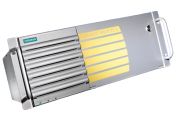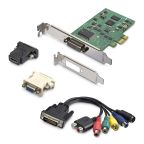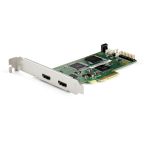Graphics Cards
A graphics card is a dedicated piece of hardware inside your computer that handles, creates and displays images/videos to your display device, like a computer monitor or projector.
Graphics cards have several different video output connections including VGA, DVI and HDMI. These will determine what devices you can connect to it. To fit the graphics card to your motherboard, you will also need to determine the connection type, commonly they are either PCI, PCIe or AGP.
Graphics cards come in different memory sizes, usually starting from as little as 32 MB up to higher performing cards at 4, 8, 12 GB and beyond. The higher the memory, the better the performance.
What does a graphics card do?
- Creates the image or video requested by the central processing unit and displays it on your screen
- Helps smooth out video frame rates
- Deals with 3D rendering
What type of graphic card do I need?
Look at what you use your computer for, this helps determine the kind of graphics card you need.
Do you casually browse websites, sometimes watch some videos? A low to mid-range graphics card with reasonable video memory should handle these tasks while being affordable.
If you are into video editing, or gaming for example, a higher tiered graphics card is a must and you should look towards the highest possible video memory to best handle and optimise these high demanding tasks.
6 Products showing for Graphics Cards
Related links
- StarTech.com PCIe x1 4GB Graphics Card HDMI, VGA Output
- Matrox PCIe x16 512MB Graphics Card M Series DVI Output
- Siemens 512MB Graphics Card VGA Output
- Matrox PCIe x1 512MB Graphics Card M Series DVI, VGA Output
- Matrox PCIe x16 512MB Graphics Card M Series DVI, VGA Output
- StarTech.com PCIe 2GB Graphics Card HDMI, VGA Output
- Compact Flash Cards
- SmartMedia Cards





